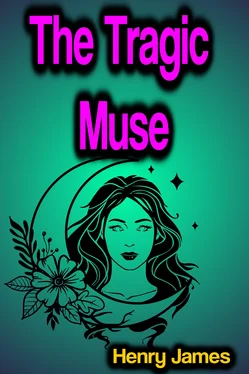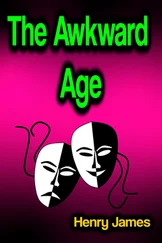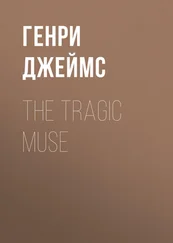Henry James - The Tragic Muse
Здесь есть возможность читать онлайн «Henry James - The Tragic Muse» — ознакомительный отрывок электронной книги совершенно бесплатно, а после прочтения отрывка купить полную версию. В некоторых случаях можно слушать аудио, скачать через торрент в формате fb2 и присутствует краткое содержание. Жанр: unrecognised, на английском языке. Описание произведения, (предисловие) а так же отзывы посетителей доступны на портале библиотеки ЛибКат.
- Название:The Tragic Muse
- Автор:
- Жанр:
- Год:неизвестен
- ISBN:нет данных
- Рейтинг книги:5 / 5. Голосов: 1
-
Избранное:Добавить в избранное
- Отзывы:
-
Ваша оценка:
- 100
- 1
- 2
- 3
- 4
- 5
The Tragic Muse: краткое содержание, описание и аннотация
Предлагаем к чтению аннотацию, описание, краткое содержание или предисловие (зависит от того, что написал сам автор книги «The Tragic Muse»). Если вы не нашли необходимую информацию о книге — напишите в комментариях, мы постараемся отыскать её.
The Tragic Muse — читать онлайн ознакомительный отрывок
Ниже представлен текст книги, разбитый по страницам. Система сохранения места последней прочитанной страницы, позволяет с удобством читать онлайн бесплатно книгу «The Tragic Muse», без необходимости каждый раз заново искать на чём Вы остановились. Поставьте закладку, и сможете в любой момент перейти на страницу, на которой закончили чтение.
Интервал:
Закладка:
"And you went then very often to the Théâtre Français, and it was there I saw you. I place you now."
"I'm afraid I noticed none of the other spectators," Nash explained. "I had no attention but for the great Carré—she was still on the stage. Judge of my infatuation, and how I can allow for yours, when I tell you that I sought her acquaintance, that I couldn't rest till I had told her how I hung upon her lips."
"That's just what I told her," Sherringham returned.
"She was very kind to me. She said: 'Vous me rendez des forces.'"
"That's just what she said to me!"
"And we've remained very good friends."
"So have we!" laughed Sherringham. "And such perfect art as hers—do you mean to say you don't consider that important, such a rare dramatic intelligence?"
"I'm afraid you read the feuilletons. You catch their phrases"—Nash spoke with pity. "Dramatic intelligence is never rare; nothing's more common."
"Then why have we so many shocking actors?"
"Have we? I thought they were mostly good; succeeding more easily and more completely in that business than in anything else. What could they do—those people generally—if they didn't do that poor thing? And reflect that the poor thing enables them to succeed! Of course, always, there are numbers of people on the stage who are no actors at all, for it's even easier to our poor humanity to be ineffectively stupid and vulgar than to bring down the house."
"It's not easy, by what I can see, to produce, completely, any artistic effect," Sherringham declared; "and those the actor produces are among the most momentous we know. You'll not persuade me that to watch such an actress as Madame Carré wasn't an education of the taste, an enlargement of one's knowledge."
"She did what she could, poor woman, but in what belittling, coarsening conditions! She had to interpret a character in a play, and a character in a play—not to say the whole piece: I speak more particularly of modern pieces—is such a wretchedly small peg to hang anything on! The dramatist shows us so little, is so hampered by his audience, is restricted to so poor an analysis."
"I know the complaint. It's all the fashion now. The raffinés despise the theatre," said Peter Sherringham in the manner of a man abreast with the culture of his age and not to be captured by a surprise. "Connu, connu!"
"It will be known better yet, won't it? when the essentially brutal nature of the modern audience is still more perceived, when it has been properly analysed: the omnium gatherum of the population of a big commercial city at the hour of the day when their taste is at its lowest, flocking out of hideous hotels and restaurants, gorged with food, stultified with buying and selling and with all the other sordid preoccupations of the age, squeezed together in a sweltering mass, disappointed in their seats, timing the author, timing the actor, wishing to get their money back on the spot—all before eleven o'clock. Fancy putting the exquisite before such a tribunal as that! There's not even a question of it. The dramatist wouldn't if he could, and in nine cases out of ten he couldn't if he would. He has to make the basest concessions. One of his principal canons is that he must enable his spectators to catch the suburban trains, which stop at 11.30. What would you think of any other artist—the painter or the novelist—whose governing forces should be the dinner and the suburban trains? The old dramatists didn't defer to them—not so much at least—and that's why they're less and less actable. If they're touched—the large loose men—it's only to be mutilated and trivialised. Besides, they had a simpler civilisation to represent—societies in which the life of man was in action, in passion, in immediate and violent expression. Those things could be put upon the playhouse boards with comparatively little sacrifice of their completeness and their truth. To-day we're so infinitely more reflective and complicated and diffuse that it makes all the difference. What can you do with a character, with an idea, with a feeling, between dinner and the suburban trains? You can give a gross, rough sketch of them, but how little you touch them, how bald you leave them! What crudity compared with what the novelist does!"
"Do you write novels, Mr. Nash?" Peter candidly asked.
"No, but I read them when they're extraordinarily good, and I don't go to plays. I read Balzac for instance—I encounter the admirable portrait of Valérie Marneffe in La Cousine Bette."
"And you contrast it with the poverty of Emile Augier's Séraphine in Les Lionnes Pauvres? I was awaiting you there. That's the cheval de bataille of you fellows."
"What an extraordinary discussion! What dreadful authors!" Lady Agnes murmured to her son. But he was listening so attentively to the other young men that he made no response, and Peter Sherringham went on:
"I've seen Madame Carré in things of the modern repertory, which she has made as vivid to me, caused to abide as ineffaceably in my memory, as Valérie Marneffe. She's the Balzac, as one may say, of actresses."
"The miniaturist, as it were, of whitewashers!" Nash offered as a substitute.
It might have been guessed that Sherringham resented his damned freedom, yet could but emulate his easy form. "You'd be magnanimous if you thought the young lady you've introduced to our old friend would be important."
Mr. Nash lightly weighed it. "She might be much more so than she ever will be."
Lady Agnes, however, got up to terminate the scene and even to signify that enough had been said about people and questions she had never so much as heard of. Every one else rose, the waiter brought Nicholas the receipt of the bill, and Sherringham went on, to his interlocutor: "Perhaps she'll be more so than you think."
"Perhaps—if you take an interest in her!"
"A mystic voice seems to exhort me to do so, to whisper that though I've never seen her I shall find something in her." On which Peter appealed. "What do you say, Biddy—shall I take an interest in her?"
The girl faltered, coloured a little, felt a certain embarrassment in being publicly treated as an oracle. "If she's not nice I don't advise it."
"And if she is nice?"
"You advise it still less!" her brother exclaimed, laughing and putting his arm round her.
Lady Agnes looked sombre—she might have been saying to herself: "Heaven help us, what chance has a girl of mine with a man who's so agog about actresses?" She was disconcerted and distressed; a multitude of incongruous things, all the morning, had been forced upon her attention—displeasing pictures and still more displeasing theories about them, vague portents of perversity on Nick's part and a strange eagerness on Peter's, learned apparently in Paris, to discuss, with a person who had a tone she never had been exposed to, topics irrelevant and uninteresting, almost disgusting, the practical effect of which was to make light of her presence. "Let us leave this—let us leave this!" she grimly said. The party moved together toward the door of departure, and her ruffled spirit was not soothed by hearing her son remark to his terrible friend: "You know you don't escape me; I stick to you!"
At this Lady Agnes broke out and interposed. "Pardon my reminding you that you're going to call on Julia."
"Well, can't Nash also come to call on Julia? That's just what I want—that she should see him."
Peter Sherringham came humanely to his kinswoman's assistance. "A better way perhaps will be for them to meet under my auspices at my 'dramatic tea.' This will enable me to return one favour for another. If Mr. Nash is so good as to introduce me to this aspirant for honours we estimate so differently, I'll introduce him to my sister, a much more positive quantity."
"It's easy to see who'll have the best of it!" Grace Dormer declared; while Nash stood there serenely, impartially, in a graceful detached way which seemed characteristic of him, assenting to any decision that relieved him of the grossness of choice and generally confident that things would turn out well for him. He was cheerfully helpless and sociably indifferent; ready to preside with a smile even at a discussion of his own admissibility.
Читать дальшеИнтервал:
Закладка:
Похожие книги на «The Tragic Muse»
Представляем Вашему вниманию похожие книги на «The Tragic Muse» списком для выбора. Мы отобрали схожую по названию и смыслу литературу в надежде предоставить читателям больше вариантов отыскать новые, интересные, ещё непрочитанные произведения.
Обсуждение, отзывы о книге «The Tragic Muse» и просто собственные мнения читателей. Оставьте ваши комментарии, напишите, что Вы думаете о произведении, его смысле или главных героях. Укажите что конкретно понравилось, а что нет, и почему Вы так считаете.












